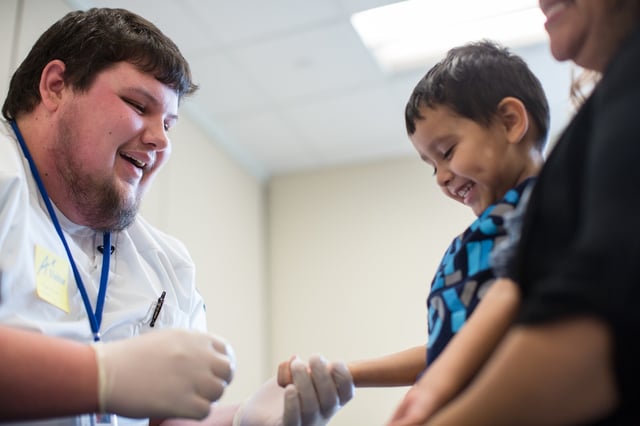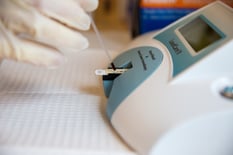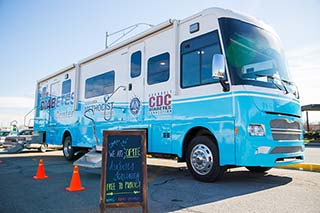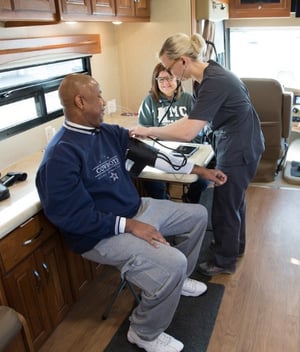
Better Health, Brighter Futures
A drop of blood is small yet mighty.
Inside are 5 million red blood cells and answers to questions like these: Is my child at risk for lead poisoning? Do I have diabetes? Could my family’s health and future be in danger?
In Omaha and beyond, students and staff of Nebraska Methodist College are helping to answer these questions. They do this with compassion, skill and one quick finger prick at a time — and without expecting the public to find the time and transportation to come to them.
Instead, NMC takes screenings and education to where the needs are greatest, working with other community organizations to protect and improve health.
Lead Screenings for Schoolchildren
Pediatric nurse Matthew Kisicki, a recent NMC graduate (shown above, volunteering his time to do lead testing), is passionate about protecting children from lead poisoning.

“Without lead testing, we’re setting kids up for failure,” said Kisicki. “Lead is a neurotoxin that lingers in a child’s brain and body, and we don’t see symptoms until it’s too late.”
The Centers for Disease Control cites lead poisoning as a cause of kidney failure, seizures, coma or death. Even low lead levels can permanently reduce a child’s IQ, growth and ability to succeed in school and life.
Why are Omaha’s children in danger of lead poisoning? Because for 125 years, lead processing plants in downtown Omaha released tons of toxic emissions that settled into yards and homes.
The Environmental Protection Agency investigated, and, in 1999, created the nation’s largest residential Superfund site: the 27-square-mile Omaha Lead Superfund Site,.
Kisicki grew up in the Superfund site, in a home with lead paint. As a child, he picked paint chips from the windows. As an adult, he has volunteered countless hours with the Nebraska Methodist College Lead Testing Initiative.
 In fall 2017, this collaborative initiative, piloted and coordinated by Echo Perlman, DNP, RN, an NMC graduate (2010) and assistant professor of nursing, provided lead screenings to 1,000 children in elementary schools and Head Start programs in the Omaha Lead Superfund Site in.
In fall 2017, this collaborative initiative, piloted and coordinated by Echo Perlman, DNP, RN, an NMC graduate (2010) and assistant professor of nursing, provided lead screenings to 1,000 children in elementary schools and Head Start programs in the Omaha Lead Superfund Site in.
“Identifying a child at risk for lead poisoning used to require a doctor’s appointment,” said Perlman (shown at left). “Now, with parental and school permission, our nursing students collect a drop of a child’s blood with a finger prick. Three minutes later, the Douglas County Health Department (DCHD) has the results by fax.”
Khari Muhammad is program coordinator for the DCHD’s Childhood Lead Poisoning Prevention Program. Through this program and as part of an EPA-funded grant, Muhammad explained, every elevated lead level identified by Nebraska Methodist College triggers follow-up blood testing plus any education, treatment, environmental assessment and cleanup needed to prevent future lead exposure.
“The uniqueness of the program,” said Muhammad, “is the collaboration that begins with lead screening by Nebraska Methodist College and continues with the multiple steps and multiple community partners involved in keeping Omaha’s children safe from lead poisoning.”
Mobile Diabetes Center
Celeste Ehrenberg, a DCHD community health planner, wants the public to know the growing diabetes epidemic is very real and very dangerous.
“One in three American adults has prediabetes, a serious but often reversible disease characterized by above-normal blood sugar levels,” said Ehrenberg. “Most don’t know they have prediabetes or that it is increasing their risk for heart disease and stroke as well as type 2 diabetes, the nation’s seventh-leading cause of death.”
 Ehrenberg noted that partnerships are essential in the battle to prevent diabetes and other chronic diseases. She called the partnership with NMC’s Mobile Diabetes Center (MDC) “a win-win,” as illustrated by the success of the free diabetes screenings offered on-site with cooking demonstrations and food-tasting events in the DCHD’s Healthy Neighborhood Store Program.
Ehrenberg noted that partnerships are essential in the battle to prevent diabetes and other chronic diseases. She called the partnership with NMC’s Mobile Diabetes Center (MDC) “a win-win,” as illustrated by the success of the free diabetes screenings offered on-site with cooking demonstrations and food-tasting events in the DCHD’s Healthy Neighborhood Store Program.
The MDC is a custom-built, 38-foot-long RV with amenities that include a wheelchair lift and three rooms for diabetes screening, foot care and full examinations. Here, NMC students and staff provide non-diagnostic screenings, education and referrals as part of the service learning interwoven into their community-based curriculum. They travel to wherever care is needed, including churches, north and south Omaha health fairs, grocery store parking lots and homeless shelters.
 Each year, the MDC provides about 1,600 individual screenings throughout the region. This is possible through a strong partnership with the Cornbelt Diabetes Connection, which provides the mobile unit and driver.
Each year, the MDC provides about 1,600 individual screenings throughout the region. This is possible through a strong partnership with the Cornbelt Diabetes Connection, which provides the mobile unit and driver.
“Bringing knowledge about diabetes and related health services to people who don’t have access to either is a beautiful thing to behold,” said Terry Sanford, president of the Cornbelt Diabetes Connection.
Editor's Note: This story originally appeared on pages 12-13 of the Spring 2018 issue of The Meaning of Care magazine.